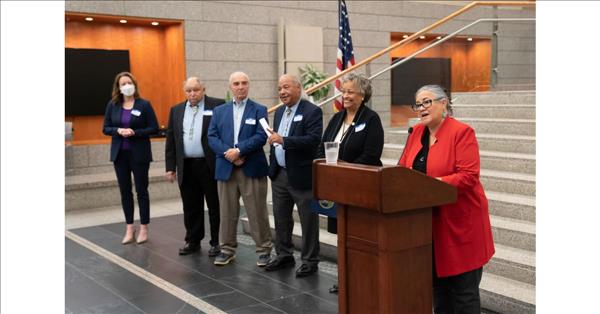
Tribal Nations In Virginia Mark 5 Years Since Federal Recognition
[R to L]: Chief Richardson, Rappahannock Tribe (at podium); Secretary of the Commonwealth James; Chief Adkins, Chickahominy Indian Tribe; Chief Branham, Monacan Indian Nation; Chief Stewart, Chickahominy Indian Tribe- Eastern Division, & Marion Werkheiser, CHP, PLLC
RICHMOND, VA, USA, January 30, 2023 /einpresswire.com / -- This week six Tribal Nations in Virginia observed the fifth anniversary of the United States formally recognizing their sovereign governments. Recognition has enabled the tribes to build infrastructure and programs through which they serve thousands of tribal citizens as well as neighboring community members with health care, food, education, housing, emergency preparedness, and environmental stewardship.The Chickahominy Indian Tribe, the Chickahominy Indian Tribe-Eastern Division, the Monacan Indian Nation, the Nansemond Indian Nation, the Rappahannock Tribe, and the Upper Mattaponi Indian Tribe were recognized after decades of advocacy. President Trump signed the Thomasina E. Jordan Indian Tribes of Virginia Federal Recognition Act of 2017 into law on January 29, 2018.
Federal recognition means that tribal governments have legal standing in direct relationships with the U.S. government.“We are able to compete for federal funds, place land into trust, repatriate the remains of our ancestors in a respectful way, and have a voice in federal agency actions that could harm us,” said Chief Frank Adams of the Upper Mattaponi Indian Tribe, which opened a health clinic at the height of the pandemic that serves the entire King William County community.
“The years after federal recognition are like drinking out of a firehose,” said Gerald“Jerry” Stewart of the Chickahominy Indian Tribe-Eastern Division about the opportunities and obligations that come from the government-to-government relationship between a small tribal nation and the federal bureaucracy.“Then came COVID, which both devastated and led to long-overdue federal investments in Indian Country.” The Tribe has built a booming childcare facility with a curriculum steeped in their culture.
“We are still here and we are thriving,” said Kenneth Branham, Chief of the Monacan Indian Nation, headquartered in Amherst and the largest of the tribes with 2,895 enrolled citizens. The Monacans have leveraged their recognition to secure the protection of their ancient capital at Rassawek from destruction by a government project, organize a food bank, build an elder-care facility, and deliver more than sixty other accomplishments .
Despite being among the first peoples encountered by colonists, the six tribes are among the latest to be recognized of 574 Indian tribes in the U.S. They faced multiple obstacles. For years Virginia ignored tribal treaties because they were made with England before the US government existed. Virginia's Racial Integrity Act of 1924 led to a“paper genocide” in which the Commonwealth destroyed Native birth records, marriage certificates, and land titles. It took many decades and much funding for the tribes to meticulously reconstruct proof of their lineage and continuity of governments.
Eventually, a bipartisan coalition including U.S. Senators Tim Kaine (D) and Mark Warner (D), former Senator George Allen (R), and Congressman Rob Whitman (R), citing the injustice of the delay, secured the votes for passage of a legislative remedy.
During the passage of the bill, Kaine spoke from the Senate floor:“...even here in the United States Congress and the United States Senate, occasionally we get things right. And boy, oh, boy, this is a day where we get things right on a civil rights basis, on a moral basis, on a fairness basis, and to our friends who are representatives of the six tribes who are finally going to be granted federal recognition, we want to say thank you for their patience, their perseverance, their willingness to work with us and others.”
Federal recognition, the pandemic, and concerns about the climate crisis have converged to cause government and social institutions to seek out indigenous knowledge from the tribes in Virginia and to enlist them in managing solutions.
The Rappahannock Tribe has leveraged federal status to secure the return of 465 acres at Fones Cliff, on the eastern side of the Rappahannock River, where they occupied at least three villages and which today is home to a large breeding population of bald eagles.“We will create public access trails and cultural and conservation education programs,” said Chief Anne Richardson, who has another 500 acres at Fones Cliff in her sights.
The Nansemond Indian Nation, whose pow-wow is typically the city of Suffolk's largest tourist draw, is also conserving ancestral lands and restoring their traditional oyster beds in the Nansemond River. And when COVID vaccines were hard to get, the Nansemonds shared their supply and vaccinated hundreds of their non-Native neighbors. Chief Keith Anderson observed,“The savvier of the local governments are awakening to the advantages of having federally-recognized tribes as neighbors and are reaching out proactively to partner.”
As they celebrate this milestone anniversary, the tribal leaders noted that federal recognition also transforms their relationship with the Commonwealth.“Our people have lived in what became Virginia for more than 10,000 years,” said Stephen Adkins, Chief of the Chickahominy Indian Tribe and a veteran of numerous state boards and commissions.“But we are still working to bring Virginia government up to speed on what it means to have sovereign tribes also able to serve citizens in the Commonwealth.” That work includes briefing Virginia courts on dealing with Indian Child Welfare Act cases, assisting state agencies with identifying significant environmental and cultural resources threatened by development, and crafting bills for consideration by the General Assembly.
Last year, the tribes worked with state leaders to create a commission to update relevant aspects of the Virginia code to reflect the presence of federally recognized tribes. A second bill made tribal governments eligible for grants from the Virginia Land Conservation Fund. The tribes' top priority for this year's legislative session is passage of SB 1332/HB 2004, which would require state agencies to consult tribes when permitting projects that could impact their environmental, historic, or cultural resources; under current law, the tribes need not even be notified.
The law and strategy firm Cultural Heritage Partners (CHP), PLLC, serves as general counsel to each of the six tribes as they navigate the challenges of growing sovereign governments. Founding Partner Greg Werkheiser observed,“It has been a privilege to witness this profound progress in Native, American, and Virginia history.”
# # #
Photo by Digital Image House
Greg Werkheiser
Cultural Heritage Partners, PLLC

Legal Disclaimer:
MENAFN provides the information “as is” without warranty of any kind. We do not accept any responsibility or liability for the accuracy, content, images, videos, licenses, completeness, legality, or reliability of the information contained in this article. If you have any complaints or copyright issues related to this article, kindly contact the provider above.






















Comments
No comment